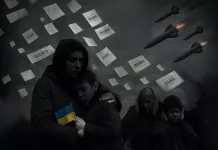
Two and a half years after Russia annexed Ukrainian Crimea, it gets only scarier and harder for the peninsula’s citizens to voice an opinion if it differs from Russian authorities, according to Krasimir Yankov, human rights researcher in Ukraine for Amnesty International, Alyona Zhuk wrote for Kyiv Post.
“We are now talking not only about disregard of freedom of speech and narrowing of the rights for self-expression, we are talking about the criminal prosecution of the dissent,” Yankov told in the interview to the RFE/RL’s Crimea news website, Krym.Realii, on Nov. 5.
Since the Russian military invasion, human rights organizations have documented at least 269 cases of human rights violations, including kidnappings, searches of offices and apartments, arrests and criminal cases being brought on bogus charges.
Yankov has spent five days in Crimea together with other monitors from Amnesty International. The organization will issue a report following the mission’s findings in December.
He says that Russian officials in Crimea do not prosecute all Crimean Tatars because some of them cooperate with the authorities and support them. However, everyone who does not agree with Russia’s regime, risk their freedom.
Six men, accused of membership in Hizb ut-Tahrir, an international Islamic political organization, which is legal in Ukraine and which was banned in Russia as a terroristic one, have already spent more than six months behind the bars in the pre-trial detention facility in Crimea. According to their lawyer Emil Kurbedinov, the investigators with the Russia’s Federal Security Service appointed forced psychiatric examination for them.
Such measures have already been applied to Ilmi Umerov, a 59-years-old deputy chairman of the Mejlis of the Crimean Tatar people (the Crimean Tatar’s parliament) and a former Crimean civil servant. He is accused of making public calls for the violation of the territorial integrity of the Russian Federation, and, if proven guilty, will face up to five years in prison. Despite the numerous calls from the international human rights watchdogs, he was put into the psychiatric clinic for three weeks until Sept. 7.
Umerov denies the accusations, saying he was rather calling for the restoration of the territorial integrity of Russia. Talking to the Crimean Tatar television channel ATR in March 2015, Umerov said that Ukraine, as well as its Western partners, should intensify the sanctions against Russia so that Russia will have to leave Crimea and Ukraine’s eastern regions voluntarily.
However, the linguistic examination of his interview, provided by the Russian experts, confirmed extremism in his words, Umerov said in a Facebook post on Oct.20.
Referring to the news about six accused men to be put into the psychiatric clinic, he said in a recent post on his Facebook page that the new authorities in Crimea were trying to bring back the elements of punitive psychiatry, that had been widely used in the Soviet Union.
“When a healthy person has to stay in the psychiatric clinic, even for the “expertise” – is a torture aimed to intimidate. .I wish you patience and strength of mind,” he said.
In the meantime, Russian authorities in Saint Petersburg distribute posters around the city and in the underground that say: “Extremism is not a joke, even online. It will take to the bottom – you will get the real sentence.” It also refers to the article of Russia’s Criminal Code about public calls for extremism – the punishment is from two to five years in jail.
By Alyona Zhuk, Kyiv Post





